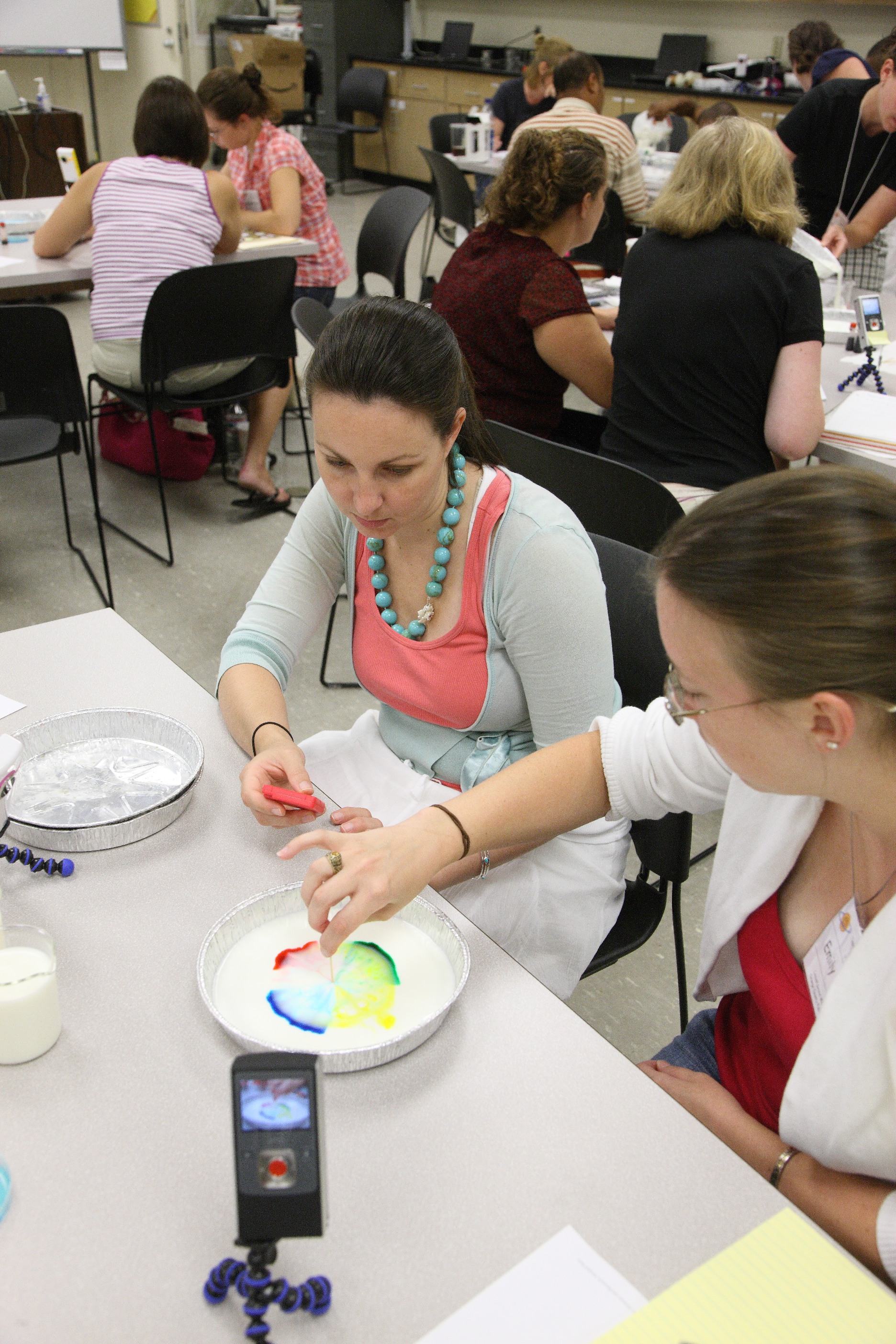July 26, 2010 — To passersby, the chatter and unhindered activity may have seemed typical for a middle school science classroom. The Ruffner Hall science lab, however, was filled not with animated adolescents, but with middle school teachers enthusiastically indulging their curiosity about a variety of scientific questions.
The University of Virginia's Curry School of Education hosted 26 middle school science teachers from across the state July 12-17 for the initial six days of a professional development institute on scientific inquiry and the nature of science. The institute was led by Randy L. Bell, associate professor of science education at Curry, and Ed Murphy, associate professor of astronomy in the College of Arts & Sciences.
Most professional development in the field of science education is about building knowledge of specific science content, such as physical science or geology, Bell said. This institute, however, was designed to address teachers' understanding of what science is and how scientific knowledge is produced and to offer strategies for teaching these concepts to middle school students.
"Frequently, teachers themselves hold a number of misconceptions about the scientific enterprise," Bell said, "much of which they picked up in their science coursework."
For example, Bell explained, we know from research that most teachers believe there is only one scientific method, when in fact, scientists use many approaches, including observation, correlation, epidemiological studies and experimentation, to name a few.
Many teachers also misunderstand scientific theories to be speculative and laws to be absolute, Bell said. "These descriptions may apply in everyday usage, but scientists use these terms differently," he said.
In science, he explained, laws describe observable patterns and relationships, while theories explain natural phenomena, including laws. A theory can never become a law; they are different kinds of knowledge. Both laws and theories are based on substantial evidence, and both are subject to change with new evidence.
"Misconceptions like these get in the way of understanding science and being able to teach it accurately to students," He said.
Lisa Kight, a seventh-grade life sciences teacher from Rippon Middle School in Woodbridge, confirmed Bell's assessment.
"I very briefly touched on those concepts in our curriculum, because they are unclear to me," she said. In the institute sessions she found that she was not alone in her confusion. "Many of us found out that we had very little concept of the nature of science."
These concepts are important, Bell said, because science plays such a significant role in many of the political and social decisions people make every day. "A functioning democracy depends on citizens who are scientifically literate, and you can't have scientific literacy without an understanding of what science is and how it is done."
For that very reason, Bell noted, Virginia's science Standards of Learning have placed an increased emphasis on these concepts.
"It seems intuitive that students could learn about science merely by doing science activities in the classroom," Bell said, "but our research has shown that they don't. Students need explicit discussions about the characteristics of scientific knowledge."
Evidently, the desire to learn more about teaching these topics is felt by many more teachers across the state. The institute was funded by an Improving Teacher Quality state grant, administered by the State Council of Higher Education for Virginia, and could admit only a limited number of teachers. The online application site was nearly overwhelmed when more than 300 teachers applied within the first three days after the announcement was posted.
"We wish we could have accommodated every teacher," Murphy said. "We hope to be able to run this institute multiple times next year, funding permitting."
Throughout the week, teachers engaged in more than 25 hands-on activities designed to connect familiar science process skills like observing and inferring to the less familiar concepts of the nature of science. The participants can use every activity in their own classrooms to help their students develop a more complete view of the scientific enterprise, Bell said.
Four U.Va scientists gave brief guest lectures on how scientific knowledge is produced in their respective fields of chemistry, biology, physics and astronomy.
The SCHEV grant covered the tuition for three graduate course credits for each participant, as well as travel expenses and classroom materials for implementing activities presented in the institute.
By the end of the day Saturday, participants had developed plans for incorporating their new knowledge in their curriculum in the coming year. Institute staff will provide ongoing teaching support throughout the year, as well as feedback based on videos that teachers will create and submit. Not only will they be filming themselves teaching, but also filming students as they conduct a project as a scientist would – trying to answer a research question based on empirical data.
The institute will hold one more face-to-face class session, when teachers gather in Hampton Roads this November for the annual conference of the Virginia Association of Science Teachers.
"This workshop has been more than we had hoped for," Kight said. "I rate this as the best class or workshop I've attended in my seven years of teaching. If I can take these ideas and incorporate them and keep building, I think it will make a difference with the kids."
Media Contact
Article Information
July 26, 2010
/content/uva-teacher-institute-clarifies-misconceptions-about-science

